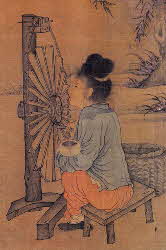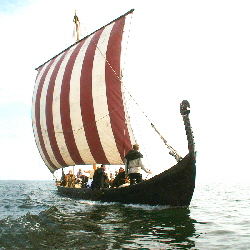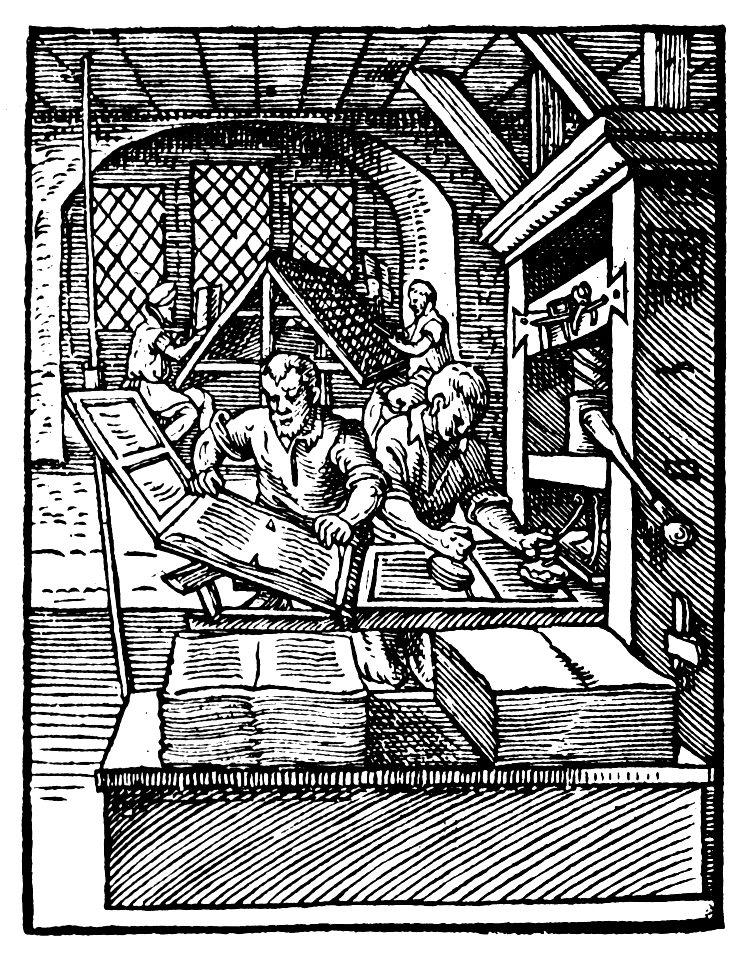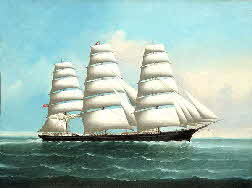1000 years of spinning wheels
 The spinning wheel was invented in China about 1000 AD and the earliest drawing of a spinning wheel that we have is from about 1035 AD (see Joseph Needham). Spinning wheels later spread from China to Iran, from Iran to India, and eventually to Europe. The spinning wheel was invented in China about 1000 AD and the earliest drawing of a spinning wheel that we have is from about 1035 AD (see Joseph Needham). Spinning wheels later spread from China to Iran, from Iran to India, and eventually to Europe.
For the previous 5,000 to 8,000 years, fibre was twisted or spun by hand on variants of the drop spindle.
The spinning wheel and cloth production
The drop spindle is a slow way of making the long lengths of fibre required for weaving cloth.  And an even longer length of fibre was required to make the sails of Viking longboats. Spinning was therefore so important and time-consuming for cloth production that it was the bottleneck for clothing and for sail-making at a time when vertical warp-weighted looms were already in use to weave cloth and to an even greater extent when horizontal heddle looms took their place in the eleventh and twelfth centuries. And an even longer length of fibre was required to make the sails of Viking longboats. Spinning was therefore so important and time-consuming for cloth production that it was the bottleneck for clothing and for sail-making at a time when vertical warp-weighted looms were already in use to weave cloth and to an even greater extent when horizontal heddle looms took their place in the eleventh and twelfth centuries.
According to Lynn White, the invention of the spinning wheel speeded up the rate at which fibre could be spun by a factor of 10 to 100 times, removing this bottleneck to cloth production. Lynn White argues that the spinning wheel lead to a breakthrough in linen production when it reached Europe around 1200 AD, with many more linen clothes being produced and many more linen rags being produced, with some unintended consequences.
Spinning wheels and paper production
 In his paper on technology assessment, Lynn White suggests that the availability of linen rags, which resulted from a step change in linen production, also removed a bottleneck in paper production, which had been recently introduced from China. In his paper on technology assessment, Lynn White suggests that the availability of linen rags, which resulted from a step change in linen production, also removed a bottleneck in paper production, which had been recently introduced from China.
Prior to the introduction of paper, books were made from parchment and a large Bible required the skins of two to three hundred sheep or calves to produce sufficient parchment.
Cheap paper then led to the introduction of printing by Gutenberg, the production of cheap books and broadsheets, and provided the opportunity for universal education and a basis for modern democracy. Therefore Cesare Marchetti argues that modern democracies are a direct, if unintended, consequence of the invention of the spinning wheel in China one thousand years ago.
Top of page
The spinning wheel and naval warfare
It is equally likely that European colonial expansion and naval warfare are also a consequence of the invention of the spinning wheel.
 The sails of Viking longboats prior to 1000 AD were entirely spun on drop spindles and the fibre for each sail would have required months of spinning before it was woven. The introduction of the spinning wheel, in combination with developments in weaving looms, would have allowed a dramatic expansion in the number, size speed of sailing ships for national and merchant navies. The consequence, or historical opportunity, of this being the colonisation of the Americas, Africa and India by European navies and nations. The sails of Viking longboats prior to 1000 AD were entirely spun on drop spindles and the fibre for each sail would have required months of spinning before it was woven. The introduction of the spinning wheel, in combination with developments in weaving looms, would have allowed a dramatic expansion in the number, size speed of sailing ships for national and merchant navies. The consequence, or historical opportunity, of this being the colonisation of the Americas, Africa and India by European navies and nations.
Therefore, the invention of the spinning wheel provided the historical opportunity for modern democracy and for naval warfare, as well as kick starting the large scale production of woven textiles.
Top of page
|

